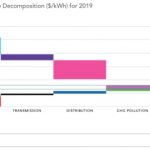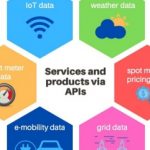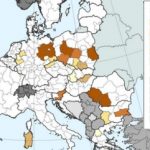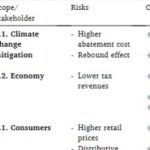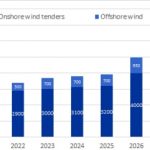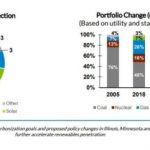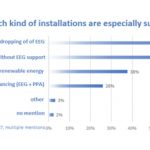Virtual Power Plants (VPPs) are the next new innovation that can change the landscape of the global energy transition in our favour, cheaply and fast, explain Liza Martin and Kevin Brehm at RMI. Essentially, they link and aggregate hundreds of thousands of households and businesses to manage their electrical devices. Their thermostats, EVs, appliances, batteries, and rooftop solar arrays are coordinated to ensure loads, charging and discharging … [Read more...]
Smart households in a high Renewables world: flexible, efficient, cheaper
Smart controls can enable household heating and EVs to interact flexibly with increasingly decentralised electricity generation. As renewables continue to be added to the energy mix, it will increase efficiency, reduce load, and save money. Marco Reiser and Karoline Steinbacher at Guidehouse summarise the challenges and opportunities, before looking at the SINTEG pilot in Germany. The main hurdles are technological (standardisation, interfaces, … [Read more...]
Can full-scale Distributed Solar really save $473bn in grid investments?
A giant model of the entire US electricity sector which captures distributed energy resource (DER) potential has been getting a lot of attention. It estimates that distributed solar and storage can save $473bn in system-wide costs when deployed at scale (enough to power more than 25% of US homes). Rooftop solar is definitely much more expensive than grid generation, but its location (on your own roof) avoids a range of costly transmission and … [Read more...]
California: Designing electricity rates that are fair and encourage EV and Heat Pump take-up
Electricity prices in California are not fair and not good for incentivising electrification, says James Sallee at the Energy Institute at Haas, because of the way people are being billed. There is no doubt that electrification (grid upgrades, etc.) and climate mitigation (including controlling California’s wildfires caused by power cable failures) must add to the cost of transition. But Californians can now find themselves paying up to twice the … [Read more...]
A marketplace for energy data will enable Europe’s grid expansion
The growth of the decentralisation of energy generation and storage combined with the digitalisation of the metrics of supply and demand is pointing towards a marketplace for energy data, explain Veronika Spurná and Helena Uhde at the EU-China Energy Cooperation Platform. Such a marketplace will monetise the data itself, in recognition of its vital role in enabling the intelligent distribution of energy and investment. There will also be a place … [Read more...]
Coal regions are ideally suited for utility-scale Wind, Solar and jobs
Over 15% of total greenhouse gas emissions in the EU come from coal-fired energy generation. 18 EU countries still use coal for electricity production. The argument goes that the phasing out of coal threatens the livelihoods of coal workers and their regional economy. But it should be the opposite, argue Elif Gündüzyeli and Jörg Mühlenhoff at CAN Europe. Coal regions are ideally suited for new gigawatt-scale wind and solar. They already have the … [Read more...]
Rooftop Solar: economies of scale can challenge the centralised grid
One of our recent articles explained how rooftop solar PV is more expensive that a centralised supply, and that the transmission and distribution cost savings of the rooftop system, on their own, do not make up for this cost difference. Here, Javier López Prol at the Wegener Center for Climate and Global Change, University of Graz, responds to those challenges. First, the economies of scale of distributed rooftop solar are yet to be realised. … [Read more...]
Why promote Rooftop Solar when the Grid is so much cheaper?
Is rooftop solar in the U.S. getting more support than it deserves? One main argument from its advocates is that it will cut grid transmission and distribution costs that total hundreds of millions. Severin Borenstein at the Energy Institute at Haas crunches some numbers to try to uncover the true “avoided costs”. He shows that any savings won’t come even close to making up for the higher cost of rooftop electricity. It’s no match for the grid’s … [Read more...]
Will Germany’s “EEG” energy law amendments make renewable targets harder to meet?
Germany’s Renewable Energy Sources Act (Erneuerbare-Energien-Gesetz/EEG), now 20 years old, is under discussion as a new amendment is supposed to come into force on January 1st 2021. Simon Göss at Energy Brainpool takes a detailed look at the highlights, including the new and higher targets, the financial role of municipalities, clean electricity subsidies, and solar and wind tender volumes. He explains there has been serious criticism of the … [Read more...]
Sweden’s new “prosumers”: electricity generation at the city, village and residential level
54% of Sweden’s power already comes from renewables – the target is 100% by 2040 - and more and more is being generated locally on a small distributed scale, says Harry Kretchmer writing for the World Economic Forum. ‘District Heating’ plants are today using excess heat to warm over 75% of Swedish homes. Residential generation is happening too, creating “prosumers” who both produce and consume. In Ludivika, 1970s flats have been retrofitted with … [Read more...]
Virtual blockchain for prosumers replicates a live utility-scale grid
Wayne Hicks at NREL describes research that’s created a virtual blockchain “prosumer” accounting system that replicates a live utility-scale grid. The goal of a real-world application is to allow countless individual households with their own electricity storage and generation to buy and sell power to each other; a truly revolutionary pathway. Clearly, it will require a system that securely accounts for vast amounts of transactions - a big enough … [Read more...]
Midwest U.S. grid operator MISO: modelling for a clean energy future
Planning can’t be easy for a grid operator. Take MISO which operates one of the world’s largest energy markets. They’re responsible for integration and bulk transmission across the central U.S., but decisions on the actual future energy mix and demand are being made elsewhere: by state governments, utilities and consumers big and small. Given the amounts invested in infrastructure and the lead times involved, no one will thank MISO if their … [Read more...]
Germany 2021: when fixed feed-in tariffs end, how will renewables fare?
Starting in 2021 many of Germany’s existing “pioneer” wind turbines, solar PV installations and biogas plants – launched with generous price guarantees - will stop receiving fixed feed-in tariffs. That means renewable capacity may be shut down if they can’t find a new business model to run on. The new rules comes at a decisive time for Germany’s energy transition as it tries to increase renewables to meet emissions targets and gradually increase … [Read more...]





